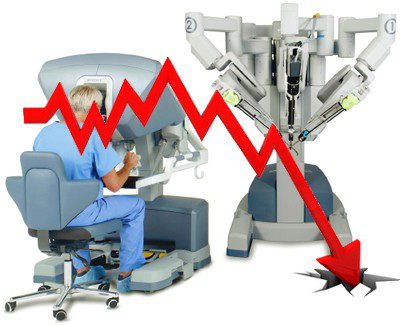
Intuitive Surgical, which manufactures and markets the da Vinci surgical robot, just released information concerning quarterly sales, which have declined by almost half, and that the drop is related, in part, to thousands of lawsuits brought over alleged da Vinci injuries. Personal injury lawsuits brought over the da Vinci have alleged significant internal injuries, such […]
 Intuitive Surgical, which manufactures and markets the da Vinci surgical robot, just released information concerning quarterly sales, which have declined by almost half, and that the drop is related, in part, to thousands of lawsuits brought over alleged da Vinci injuries.
Intuitive Surgical, which manufactures and markets the da Vinci surgical robot, just released information concerning quarterly sales, which have declined by almost half, and that the drop is related, in part, to thousands of lawsuits brought over alleged da Vinci injuries.
Personal injury lawsuits brought over the da Vinci have alleged significant internal injuries, such as burns, tears, and other complications; that some procedures have left patients suffering from chronic pain or disability; and that some patients died. Lawsuits blame Intuitive’s long-known aggressive marketing practices, design flaws intrinsic to the da Vinci, and poor physician training.
Intuitive Surgical estimates that potential legal costs from settlements related to the controversial system are “based on negotiations with opposing counsel covering approximately 3,000 claims.” Claimants may also possibly “pursue greater amounts in mediation or in a court of law,” Intuitive also indicated in a recently released statement about financials associated with the da Vinci, Bloomberg.com reports. Intuitive indicated that it will announce its full first-quarter earnings later this month.
The da Vinci robot is used for a variety of procedures, including prostate surgery and hysterectomies. During a da Vinci procedure, a surgeon sits at a console and operates the da Vinci from a control panel, Bloomberg.com, writes. An upgraded version of the robot will be released in the near future.
The da Vinci robot is promoted for use in hysterectomies; however, the American College of Obstetricians and Gynecologists has announced that, “Robotic surgery is not the only or the best minimally invasive approach to hysterectomy … nor is it the most cost-effective,” according to a The Wall Street Journal report.
Another report found that adverse reactions associated with the da Vinci surgical robot procedures may be greater than originally believed and that the under-reporting of patient injuries may be giving unrealistically positive perspectives about the surgical technology. Both issues may affect prospective robot surgery patients’ decisions.
Some patients have said that their injuries, some of which have been severe, do not appear on the U.S. Food and Drug Administration’s (FDA) database. A previous Bloomberg.com review of da Vinci surgery reports revealed dozens of injuries that have been unreported for years. The review also found that patient incidence details cited in patient interviews and legal documents were missing. An Inspector General’s report also found that reported incidence numbers are low and dropping—a 37 percent decline was seen from 2003 to 2007; however, these figures do not indicate an incidence decline, but rather, a drop in incidence reporting. The low rate “raises concerns about potential under-reporting of adverse events,” the Inspector General wrote. David Challoner, vice president emeritus for health affairs at the University of Florida pointed out that, “Every link in the chain has a reason not to report,” Bloomberg.com reported.
Intuitive Surgical has been faulted for its insufficient training and aggressive marketing. “If there was a Nobel Prize for marketing, it would go to Intuitive Surgical,” John Mulhall, a urologist at Memorial Sloan-Kettering Cancer Center in Manhattan, told Bloomberg.com in 2013. Prior to that, in 2011, a study published in the Journal for Healthcare Quality, and conducted by Johns Hopkins School of Medicine researchers, found that 164 hospital robot surgery websites surveyed “overestimate benefits, largely ignore risks, and are strongly influenced by the manufacturer,” Bloomberg.com then reported.


